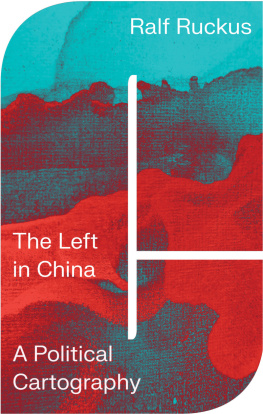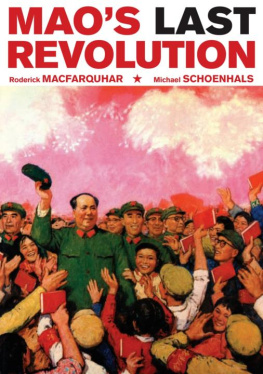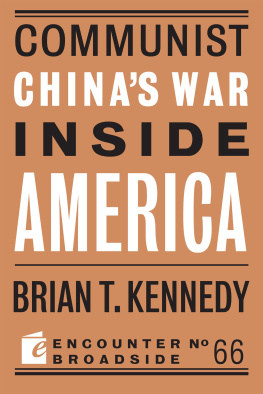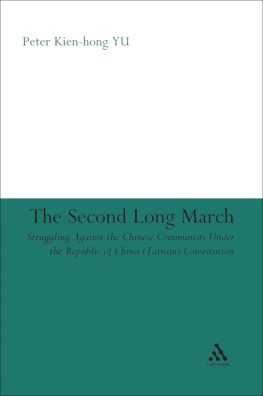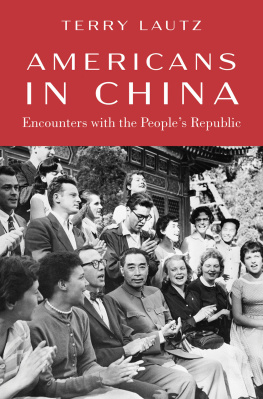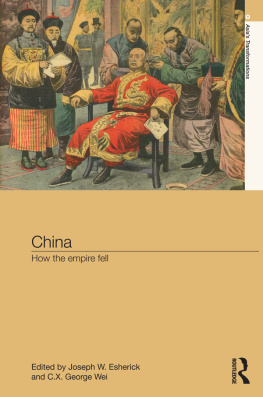China's Communist
Revolutions
Fifty Years of The People's
Republic of China
China's Communist
Revolutions
Fifty Years of The People's
Republic of China
Edited by
Werner Draguhn
and
David S.G. Goodman
First published 2002
by RoutledgeCurzon
2 Park Square, Milton Park, Abingdon, Oxon, 0X14 4RN
Simultaneously published in the USA and Canada
by RoutledgeCurzon
270 Madison Ave, New York NY 10016
RoutledgeCurzon is an imprint of the Taylor & Francis Group
Transferred to Digital Printing 2006
Editorial Matter 2002 Werner Draguhn and David S.G. Goodman
All rights reserved. No part of this book may be reprinted or
reproduced or utilised in any form or by any electronic,
mechanical, or other means, now known or hereafter invented,
including photocopying and recording, or in any
information storage or retrieval system, without permission in
writing from the publishers.
British Library Cataloguing in Publication Data
A catalogue record of this book is available from the British Library
Library of Congress Cataloguing in Publication Data
A catalogue record for this book has been requested
ISBN 0700716300
Publisher's Note
The publisher has gone to great lengths to ensure the quality
of this reprint but points out that some imperfections
in the original may be apparent
Contents
Preface
The People's Republic of China (PRC) was formally established on 1 October 1949. While the Chinese Communist Party (CCP) and the PRC itself celebrated the Fiftieth Anniversary on a grand scale in Beijing, there have been a number of smaller and more academic events organised around the world. At the end of September 1999, just before the Fiftieth Anniversary, the Institute of Asian Affairs, Hamburg and the Institute for International Studies, University of Technology, Sydney, organised an academic conference in Hamburg attended by scholars from the USA, Europe, Australia and China to mark the occasion.
Rather than attempting a definitive overview or even assessment of fifty years of the PRC the aim of the conference was to encourage its participants to be somewhat more irreverent and iconoclastic than usual in their approach, both towards the study of Contemporary China as it has become known as a field of academic enquiry, and towards the events that saw the emergence of the PRC and its development since 1949. Critical analysis was encouraged. Hence the more than somewhat tongue-in-cheek title of the conference: Was the Chinese revolution really necessary? No one was asked to tackle this question in full but rather those giving papers were invited to comment on specific aspects of revolution and change (inevitable and otherwise) during particular periods before and after the establishment of the PRC. The papers in this edited collection represent a selection from those presented at the conference, together with a final paper that was written as a direct result of discussions at the conference about social and political change in the PRC.
Contributions by Ramon Myers, Joseph Esherick and John Fitzgerald consider the economic, social and political environments out of which the PRC emerged. Mark Selden and Marie-Claire Bergre examine the socio-political impact of communist power during the 1950s. Robert Ash and Michael Schoenhals each in their different ways challenge accepted orthodoxy about the Cultural Revolution. Margot Schller, Kay Mller and David Goodman present interpretations of key aspects of reform: economic structures, foreign policy and political change. Throughout, the emphasis is on change in the context of twentieth century China, and as part of the Chinese Communist Party's search for paths to development: hence the title to the collection that speaks of revolutions in the plural.
Many people were involved in the organisation and presentation of the conference in Hamburg and their considerable assistance and fortitude should be acknowledged. Academic arrangements for the event were masterminded by Sebastian Heilmann, now of the University of Trier, but then a colleague at the Institute of Asian Affairs. Staff at both the Institute of Asian Affairs, Hamburg, and the Institute for International Studies, UTS, and in particular Sandra Margon of UTS, played a crucial organisational role.
The conference was sponsored by the Thyssen Foundation, Germany, and the generosity of its support is gratefully acknowledged. At a time of disappearing social funds for academic research support and sponsorship of this kind is greatly appreciated.
Finally the success of the conference was very much the product of all those who attended and gave so generously of their time and ideas. In addition to those whose papers are presented in this collection they included Gereme Barm, Tom Bernstein, Lucien Bianco, Feng Chongyi, Jean-Luc Domenach, Rick Edmonds, Edward Friedman, Stefan Friedrich, Merle Goldman, Bettina Gransow, Thomas Heberer, Sebastian Heilmann, Hans Hendrischke, Barbara Krug, Roderick MacFarquhar, Rdiger Machetzki, Minxin Pei, Pitman Potter, Eberhard Sandschneider, Monika Schdler, Gnter Schucher, Chih-Yu Shih, Dorothy Solinger, Brunhild Staiger, Markus Taube, Andrew Walder, Wei Hongyun, and Benjamin Yang.
Werner Draguhn | David S. G. Goodman |
Institute of Asian Affairs | University of Technology |
Hamburg | Sydney |
1
Revolution and Economic Life in Republican China: From World War I until 1949
Ramon H. Myers
The collapse of the Qing dynasty in 1911 left a leadership vacuum that was not filled until Mao Zedong announced on October 1, 1949, at Beijing's Tiananmen Square the creation of a Chinese socialist state, thus unifying China. Different ideas for organizing China's political center had competed over this long period. But of all these competing ideas, only Mao Zedong's thought successfully convinced a majority of Chinese elites that a CCP-led revolution could remove the grand obstacles feudalism, capitalism, and imperialism preventing China from building that great commonwealth of harmony, virtue, and prosperity, the datong. The power of ideas, particularly those of Mao, inspired enough Chinese from all backgrounds to participate in the revolution led by the Chinese Communist Party (CCP).
But ideas were not enough for this revolution to succeed. There had to be new policies and organizations that altered China's economic life to persuade the Chinese people to join that revolution and unify China under a new system of governance and way of economic life. How did China's economic life between World War I and the end of the civil war interact with revolution?
China's Three Economies
A society's economic life can be understood by examining how three types of economies have competed and coexisted with each other until modern times. Space does not allow a detailed account of China's economic history to describe these interactions. It is only important to mention their characteristics to better understand how they reflected economic life during the Republican era (191149). First, China's customary economy had always exceeded in size and activity two other economies, the command and market economies. In the customary economy, households exchanged resources and produced goods and services for direct household consumption. They typically did this without reference to the market-determined values of exchange of the market economy. In effect, custom or habit dictated family or lineage households, as well as village exchanges, which consisted of oral or written agreements-contracts, if you will. Because 9095 per cent of China's population lived in rural communities and small towns, the majority of these people spent much of their daily economic life exchanging resources with each other for organizing the production of goods and services consumed within the household, village, or market town.


